Group Study Rooms
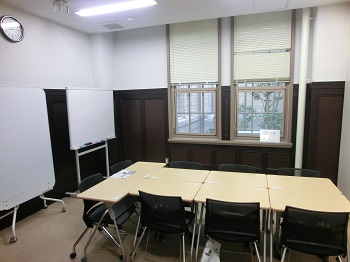
Students of social science faculties can reserve Group Study Rooms one week in advance, while other students can make reservations on the day of use.
Movable chairs and tables, white boards and screens are available.
If necessary, the partition between Group Study Rooms 1 and 2 can be removed for a large group of people.
Terms of Use
- Available for group studies of three or more people.
* For nine or more people, two rooms can be connected together. - Only those affiliated to the departments or faculties of social sciences can book via the website.
* Only on the day of use and booking, internal users other than those listed above can apply at the main desk.
* Not for only external users. - Only for study and research.
- From the week before the exam to the end of the exam, the rooms cannot be reserved, but available as study rooms.
How to Reserve
- Reservations can be made on the website one week before the date of use.
- Your representative can apply here.
*If the rooms are to be connected, they must be reserved by a person other than the representative of the group (who must be a member of the University).
In this case, please indicate in the remarks column that they are part of the same group.
(Case 1) When the representative of the group reserves Group Study Room 1, please fill in the “Notes” column “Same group as 2”.
(Case 2) When a user other than the representative of the user reserves Group Study Room 2, please fill in the “Notes” column “the same group as 1”.
Hours of Use
- Hours of use are:
* weekdays: 8:50am – 30 minutes before closing.
* Saturdays and Sundays: open – 30 minutes before closing. - A maximum of 90 minutes can be booked per group.
※If no one else is booked, you can extend your stay by up to an additional 90 minutes. Please ask at the information desk.
How to Use
- Please show your representative’s student ID card or library card at the Main Desk.
- If your representative doesn’t arrive at the Main Desk after 15 minites of the appointment time, your reservation will be canceled.
- Please note the following:
・Please leave the door open.
・No food or drink allowed. (Only capped drinks may be brought in).
・Please refrain from loud noises or other behaviour that disturbs the surroundings.
・When leaving the room, please return the room to its original state, switch off the air conditioning and lighting.
・Use may be restricted if the rules and etiquette of use are not observed.
Equipments
Movable Chars, Desks, White Boards, Screens
Projector (please ask at the main counter)
Break Room
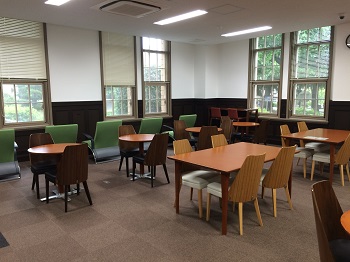
The break room is for relaxing.
Only drinks are allowed.
You can chat with your friends or take a break here.
Main Reading Room
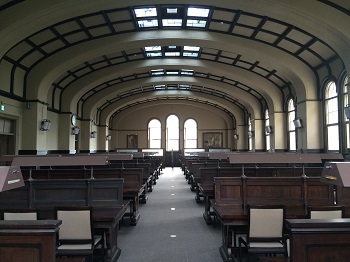
The Main Reading Room is for quiet study. Unlike the Sub Reading Room, you can use your laptop.
This room is preserved as it was built in 1933 as an example of the architecture of that era.
Sub Reading Room
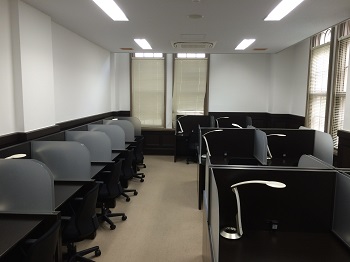
The Sub Reading Room is for very quiet study. Anyone can use this room, but use of electronics such as laptops and calculators is prohibited here due to the noise of typing on a keyboard.
Browsing Room
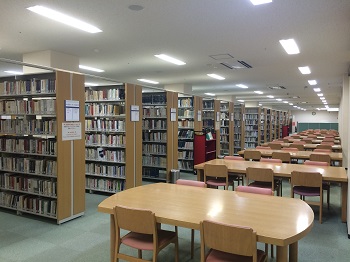
There are approximately 80,000 study and reference books in the library. There are also reading desks, audio-visual booths, and a global book corner.
Journals Room
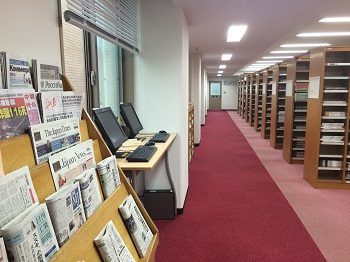
Materials in Journals Room
Newspapers and current journals are available. Newspapers from the last 2 months and journals issued within the last 1 year are located in the Journals Room.
NCOP journals are also available here.
Back issues are stored in the stacks.
How To Use Journals
Journals are generally for in-library use only, but you can lend them for a day.
Sometimes journals for the preceding year are unavailable because they are being bound.
The National Center for Overseas Periodicals
How To Use NCOP
The “NCOP” is located in the Library for Social Sciences.
Journals of the NCOP are treated in the same way as general journals .
If you have any questions about the NCOP, please ask at the information service section for social sciences.
Current NCOP Journals
Journals Room (2nd floor of Administration Building)
: Their location is separated from that of general journals.
Back Issues
Stacks(Basement 1st floor of Frontier Building)
: They are mixed with general journals.
What Is NCOP?
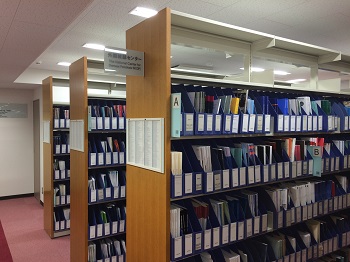
The NCOP(The National Center for Overseas Periodicals) collects rare foreign journals to supply Japanese universities and research organizations in order to enhance the national academic infrastructure. MEXT chooses 9 universities to locate NCOP branches, divided by academic field. As one of the NCOP locations, the Kobe University Library for Social Sciences collects foreign journals focusing on humanities and social sciences in collaboration with Hitotsubashi University Library.
NCOP HP
List of NCOP Locations
| Literature / Social sciences | Kobe University Library for Social Sciences Hitotsubashi University Library |
|---|---|
| Medical science | Tohoku University Library Osaka University Library Kyushu University Library |
| Science and engineering | Tokyo Institute of Technology Library Kyoto University Library |
| Agriculture | University Library for Agricultural and Life Sciences, the University of Tokyo Kagoshima University Library |
